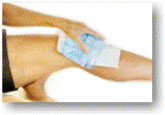Taking pain medication can help you to stay active, reduce the pain from inflammation in your joints, help you sleep and treat anxiety or depression. The benefits of controlling your pain are: increased mobility and ability to function, less fatigue, more sleep, and improved mood and mental health.
Taking Medications
The most common types of medication for managing your joint pain include:
- Analgesia such as Tylenol (acetaminophen), which works fast to reduce pain without many side effects.
- Anti-inflammatory drugs, which reduce pain and swelling, but have a higher risk of side effects (e.g. bleeding or upset stomach) and it takes a longer time to work.
- Narcotics (e.g. Tylenol #3, morphine)
Your doctor may try a multimodal, or combination of these medications to treat your condition. It’s also a good idea to premedicate, or take a small dose of your pain medication before you exercise, in order to control your pain.
Factors to consider in prescribing medications include side effects, drug interactions, and your level and tolerance of pain. Discuss with your doctor the medications you are taking, including any holistic/alternative medicine.
You may also need to stop taking some medications before your surgery.
 Using Complementary Therapies – Some patients use massage, chiropractic, acupuncture, holistic medications and other therapies to relieve and manage their pain.
Using Complementary Therapies – Some patients use massage, chiropractic, acupuncture, holistic medications and other therapies to relieve and manage their pain.
Some other useful strategies for controlling your pain are:
Using Ice to reduce inflammation, pain and swelling

- Wrap your joint in a towel
- Apply ice for up to 15 minutes
- Repeat as needed, every hour
Using Heat to reduce muscle stiffness, and relax tense muscles
- Apply heat up to 20 minutes, 3 times a day
- Do not apply heat if your joint is swollen or throbbing